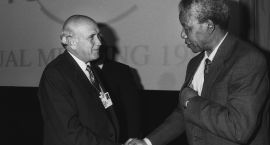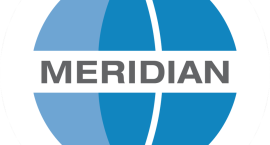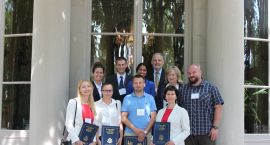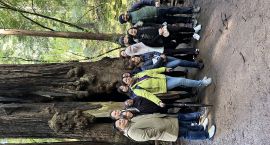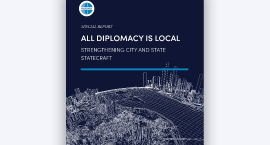This post was written by Nicholas Shafer of Global Community College Transfers, one of Meridian’s DiplomacyRISE partners. It was originally published in “The Diplomatic Pouch” at Georgetown’s Institute for the Study of Diplomacy.
This piece is part of ISD’s blog series, “A better diplomacy,” which highlights innovators and their ideas for how to make diplomacy more effective, resilient, and adaptive in the 21st century.
Diplomacy is, at least in a democracy, about representing the people. Across the U.S. foreign affairs workforce, there is a crisis of representation– as of 2020, the Senior Foreign Service was 80% white, with only 6.2% Black or African American officers, 7.6% Asian-American officers, and 7% Hispanic officers. Furthermore, the highest echelons of the Foreign Service continue to be dominated by graduates from a handful of elite universities ; a recent investigation found that Foreign Service Officers with Ivy League degrees were significantly more likely to be promoted at every stage of their careers than their counterparts from less-esteemed schools.
Despite a significant expansion of diversity and inclusion efforts, most of the initiatives seeking to work on these issues overlook one of the most dynamic, inclusive, and representative educational institutions in the country: community colleges. Due to their relative low cost and accessibility, community colleges– local colleges that offer both associate’s degrees for transfer to a four-year bachelor’s program as well as technical and vocational training programs –are often the entry point to higher education for historically underrepresented students, particularly first-generation, low-income, and non-traditional students from diverse backgrounds. However, because so few of these students are exposed to foreign affairs career pathways at their community colleges, the overwhelming majority of them will never go on to careers in foreign affairs– and never realize their missed potential. This is a huge missed opportunity both for them and employers seeking a resilient, empowered workforce.
According to the American Association of Community Colleges, in the fall of 2020, the millions of community college students across the country comprised around 41% of all students in higher education; nationally, 56% identified as non-white and almost 60% recieved financial aid, while about 30% were first generation college students. Community colleges are home to significant amounts of first generation and new American talent and both Black and Hispanic students are twice as likely to enroll first at a community college than a four-year institution. Due to the focus on local and accessible education, community colleges provide an incredibly unique and multifaceted recruiting pool for fellowships and scholarships that are majority first-generation and low-income. By simple demographic fact, this population has the traits the diplomatic corps and the programs it runs need: diversity, grit, and resilience.
However, both community colleges and foreign affairs institutions have failed to build the institutional capacity required to systematically engage this population and prepare them for entry-level jobs and fellowships in global affairs. At the community college level, study abroad trips are uncommon, internal funding and financial aid for international exposure are rare, and a focus on a global curriculum– foreign languages, international relations courses, and immersive global experiences –is relatively weak. Without proper support, community college success stories, like those of Gabriel Cortez, Joey Fernandez, Jasmine Stoltzfus, Leia Yen, Jesse Marks, Ryan Liu, Kaelyn Grace-Apple, and so many others, remain outliers and the foreign affairs community loses out on their unique grit and character. It is critical to expose non-traditional, first-generation, and low-income students to these sorts of opportunities while they are at community colleges, before they self-select into other degree programs or drop out of higher education altogether.
Professional fellowships and language programs such as Pickering or Boren are important launchpads for students seeking careers in the foreign service and U.S. government, and have received significant expansions recently. The State Department’s Foreign Affairs IT Fellowship also aims to expand diversity in recruitment targeting students at two-year schools, for example. However, these programs remain largely inaccessible to community college students, due to lack of effective advertising on community college campuses, students’ dearth of social capital, and their inability to access effective mentoring networks.
Without proper mentorship, students struggle to understand how their own diverse and non-traditional experience– particularly in a society that demeans and diminishes the value of community college study and capacities of transfer students –can increase their competitiveness in jobs such as the Peace Corps or Foreign Service. Another key issue is financial accessibility, particularly given the high rates of low-income students attending community colleges. One change that would immediately make foreign affairs careers more accessible to community college, transfer, and non-traditional students would be to expand overseas critical language training and paid internships in the field, making “experience” accessible to low-income students who otherwise cannot afford to work without pay.
By overcoming the structural and socioeconomic barriers in front of them, the students trained in U.S. community colleges are those best-suited to represent the United States in the 21st century. Because they lack institutional support, those community college students who are able to access international experience must demonstrate true commitment and self-direction to do so. This is doubly true given that community college students are more likely to come from lower socioeconomic backgrounds. Finally, community college students often lack the mentorship and elusive social capital to access highly competitive foreign affairs internships and professional development programs, which consistently give preference to elite four-year degrees within selection processes. Many of them, especially BIPOC and first-generation college students, hold down parallel jobs or have homecare requirements, making it hard for them to access what resources their colleges do have available, such as office hours with professors or events with peers. Students who can overcome these barriers and become competitive applicants to entry level foreign affairs jobs and fellowship opportunities have the sort of strength, passion, and commitment that foreign affairs employers and scholarship providers should prize and nourish.
Since May 2020, I have helped found and lead an organization, Global Community College Transfers (GCCT), that has brought together community college alumni and non-traditional students that have accessed nationally competitive global education opportunities and foreign affairs careers. Among the ranks of our core executive team and national network are Marshall and Fulbright scholars, diplomats and foreign affairs specialists, and think tankers and international consultants, all united by one core objective: to mentor and train the next generation of top community college, transfer and non-traditional talent to overcome systemic barriers to the opportunities we now have and love. We formed out of recognition of the deep need in the foreign affairs and fellowship communities to better cohesively support non-traditional access, and have done everything from organizing public conferences in partnership with dozens of scholarships and employers to targeted mentorship programs working with students one-on-one to unlock their dreams.
Our approach works. Recent participants in our mentorship program have landed internships and fellowships at top foreign affairs institutions like the State Department, USAID, the Carnegie Endowment for International Peace, and the French consulate in San Francisco. Building from our success, we are currently preparing for another round of our mentorship program in Summer 2022 that will offer several dozen promising community college transfer students high-quality training, resources, and networks to access fellowships and foreign affairs internships.
Aside from the GCCT network– an entirely volunteer-run labor of love –there are currently no other national mentorship or experiential education programs dedicated to empowering community college, transfer, and non-traditional talent to pursue global education and careers in foreign affairs. There are also no dedicated forums for these thousands of diverse students to meet one another, gather support, or learn about opportunities in the foreign affairs field. In short, there is a deep need for new initiatives to shake up the way that this non-traditional talent pool reaches the early-career internships, scholarships, and fellowships that will open up their doors in the future.
Rome wasn’t built in a day, and top foreign affairs professionals are not cultivated overnight. Investment in community college and non-traditional students should start at the level of those two-year institutions and continue through their transfer to four-year institutions and beyond. As the Biden administration seeks to rebuild the U.S. foreign policy apparatus and expand representation of under-represented groups in Washington, it is imperative that the women and men on the front lines of U.S. foreign policy reflect the communities that comprise our nation.
Diplomatic institutions should seriously commit themselves to recruiting the next generation of diplomats and foreign affairs professionals from some of the most deeply representative institutions in communities across the country. GCCT and our diverse partners– including Community College for International Development and the Meridian International Center, among others, will continue to advance these critical objectives. The time is now to invest in new programs, pipelines, forums, and training that empower both community colleges and their students to access global education and opportunities.
________________
Nicholas Shafer (@nikopoly) is a current Marshall Scholar studying Governance, Development, and Public Policy at the Institute of Development Studies in Brighton, England. A USAID alum and recipient of Fulbright and Boren Fellowships, he helps lead Global Community College Transfers, a group dedicated to training and empowering the next generation of global talent coming from community colleges across the United States. He holds a B.A. in Anthropology and Arabic Language from the University of California, Berkeley, and is a graduate of Foothill Community College in Northern California.









